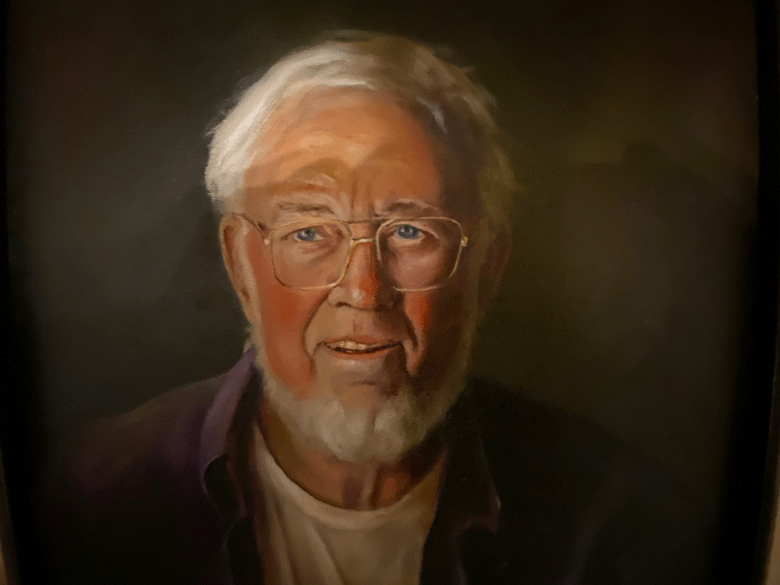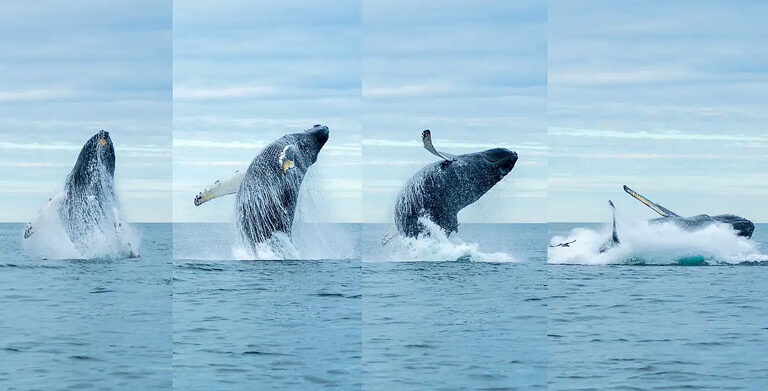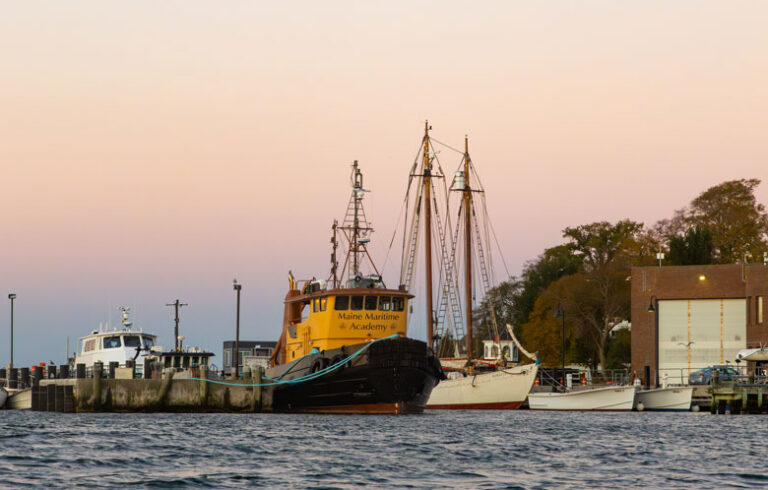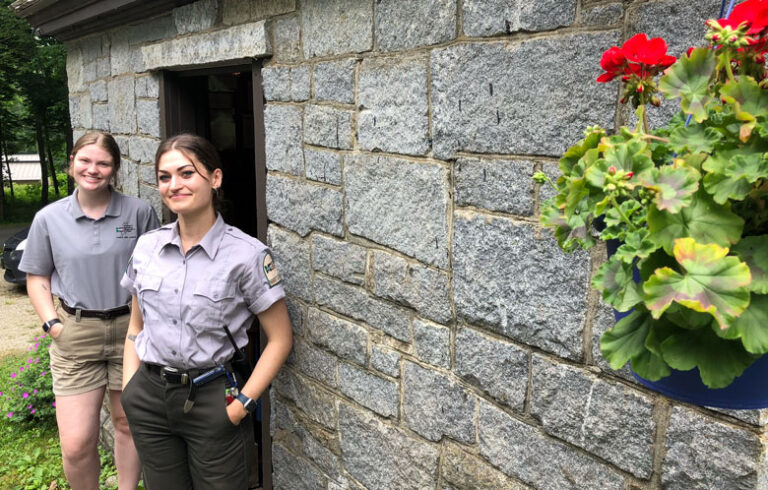The following is an edited version of remarks by Robin Alden about Rev. Ted Hoskins’ work in fisheries in Maine and across the globe, spoken at his memorial service on Sept. 10 in Blue Hill. After years leading churches and social justice efforts in Connecticut, Hoskins was minister on the Sunbeam for the Maine Seacoast Mission and was summer minister on Isle au Haut for more than 40 years.
Ted’s connection to fishermen and fishing started in childhood during his summers on Isle au Haut. Growing up there, Ted helped fishermen tend stop seines and the herring weir; he went lobstering, and his favorite, caught groundfish—cod, haddock, pollock, hake on the “Roaring Bull.” Later in life, he pursued his love of fishing in Florida and Alaska with friends and with his daughter, Robin. His respect for and affection for fishermen was intrinsic.
I first got to know Ted in the 1990s he was working as minister to coastal communities and fisheries for the Maine Seacoast Mission. Initially, it was his informal ministry that drew us together. Ted was making pastoral calls to people he cared about, just “dropping in when he was coming by.” In this case, he was calling on the grandchildren of an Isle au Haut family.
The fishermen in eastern Maine communities had been hit by a double whammy when the groundfish they caught had collapsed. In reaction, the federal government literally took away their rights, while fishermen in southern Maine and out of state were given rights to pursue groundfish everywhere, even here, in perpetuity.
Ted was doing pastoral care, but Ted the activist wanted change.
Ted was doing pastoral care, but Ted the activist wanted change. He understood that losing groundfishing left these communities and people he loved with no options; just lobstering.
He called Ted Ames, my husband, who was scientist but also a displaced groundfisherman, and me. I had just resigned from the state agency. We started eating together, small potlucks of former groundfish fishermen and their wives, sharing the losses and the anger we felt, and exploring what we could do. Out of that came Stonington Fisheries Alliance.
With Ted’s guidance, we made Stonington Fisheries Alliance a principle-based organization inspired by fisheries connections he had already made around the world, especially at the Coady Institute in Nova Scotia: “Fishermen must hold authority in management,” and “Rules must protect the community.”
These principles, and others like protecting reproduction, protecting local stocks, and establishing and recognizing limits, we used as touchstones to keep our thinking honest as we planned our advocacy. They provided us a safe way to find common ground. Our advocacy had a moral power that was palpable, if not always successful.
The next step was founding Penobscot East Resource Center, which is now Maine Center for Coastal Fisheries, a non-profit organization whose mission is to secure a sustainable future for fishing and fishing communities in eastern Maine and beyond. MCCF was our collective dream and Ted was on the board until his death. For MCCF’s staff and board, Ted was the flag held high: “Never, ever forget the fishermen.”
MCCF would not be what it is without Ted’s insights, his trust-building, and his dogged guidance.
Ted developed and led MCCF’s method for constructive meetings called Community Fisheries Action Roundtable, C-FAR for short. Ted structured the meetings to feel like kitchen table discussions. The opening question was always designed to prompt a good venting session.
Then, after the gripes, the next question: What is important to you about fishing? From there, we built on whatever was valued—feeding your family, keeping fishing healthy for grandchildren. Then, what is needed? What do we need to learn? Where can we get the information? What are the levers of power?
Once this process started, it was essential to support fishermen who wanted to take the next steps. This was long-term, community work, one person and issue at a time, which is why, in the early 2000s, there were three resource centers: MCCF, Cobscook Bay Resource Center in Eastport where Ted was a ten-year board member, and one in Digby, Nova Scotia, the Saltwater Network. We hoped to spark more community-based management throughout the Gulf of Maine.
Ted’s fisheries work was important. He got into it instinctively, caring for the communities he served. Then, typical of him, he researched and networked and learned.
In academic circles, it is now widely recognized that sustainable fishing requires those doing the fishing—the fishermen—to take responsibility for the resource. Elinor Ostrom won a Nobel Prize in economics with this finding, partly drawn from the Maine lobster fishery. The more that is learned about social and marine systems, the more significant this becomes because local observation and participation and responsibility is the only way to keep up with the changing ocean.
Ted was on the front line, bringing these cutting-edge ideas into reality. He understood that people (fishermen and top policy makers) need hope and organizations that support the human capacity to trust, learn, and work together. That was his work, always starting with the fishermen.
Ted worked globally.
He undertook a huge effort to organize fishermen in Belize, going back and forth from Maine, creating the Federated Fishers of Belize.
He brought Father Thomas Kocherry to Maine, an activist priest from South India who had mobilized more than ten million fishermen to stop factory fishing.
Ted supported and sheltered his friend Susil, a Sri Lankan fisheries leader.
Ted was a long-time board member of North American Fisheries Alliance.
Back in Maine, Ted served as the one non-fishing member of the state Lobster Advisory Council for 15 years. The 150-mile round trip to Augusta to evening meetings most months, in one of his many older Subarus, was just the tip of the iceberg of the miles he traveled to fisheries meetings of all sorts, staying informed, staying in touch, moving the process.
Ted made every room he walked into a safer place. So, I will leave you with just a peek at the impact Ted the moderator had, shaping fisheries by facilitating civil exchange over the last 30 years. He was the go-to moderator for many sessions at the annual Maine Fishermen’s Forum and for 12 years for the U.S. Canada Lobster Town Meeting that alternates between Portland and New Brunswick.
One colleague said, “The guy just sent out good ripples.” In fact, those ripples from Ted touched fishing on Isle au Haut, other Maine fishing communities, New England fisheries, and fisheries in the Maritimes, Belize, and the world.
We in the fishing community and all who care about fish and fishermen are graced to have been changed and inspired by Ted’s leadership.
Robin Alden is the founding publisher and editor of Commercial Fisheries News and a former commissioner of the Maine Department of Marine Resources. She lives in Stonington.





